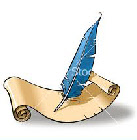Date posted: July 20, 2009 - Monday
Title: The Way It Is
Current mood: sad
I am sad this evening.
I was sad earlier in the week when the news reported the death of Walter Cronkite, but the program about his life earlier this evening brought up some feelings from deep within me.
I got into journalism in high school. Tonight I learned Cronkite did as well. I was asked to do sports reporting in a column for a small local paper. I had been calling the Los Angeles Times with results from track meets and I guess that’s where the local paper got my name. When I started writing the column it put me along a path that led into the world of writing. Oh, I had done things for English classes before that, but that spark, that publication, having a real audience, put me on the road to where I am today.
I wasn’t very good as a sports reporter/columnist. I got too involved in the verbiage and forgot the rule of objectivity which is preeminent in journalism. I remember one column I did which I am ashamed of to this day. I said some terrible things about the school basketball team. The coach of that team was a really nice guy. I learned this over time and even met his niece later in classes at a community college. And I had said some things I am sure must have hurt him; although he never said anything about it.
But the pain of that column I felt taught me a great lesson. You have to moderate your comments because you never know the whole story and you don’t hold exclusivity on truth.
I went on to work on the school paper at community college, first as a photographer and then as a reporter. That led to work on the school paper when I went on to San Diego State University; and it led to a change in my major from sciences to journalism. And that led to another sports editor position on another local paper.
This is the point where journalism, and writing, got totally into my veins. The sports editor job banging out stories on a manual typewriter, meeting a deadline and then seeing what I had written in print was an exciting experience. And when I was finished I could go to the wooden balcony just outside the newsroom which overlooked the back shop and the presses.
There is no greater thrill than watching an old hot type press begin to roll, gain speed and finally fill the air with a rumbling whine and shake the building as it poured out paper after paper to be distributed to the community.
And what does this have to do with Walter Cronkite?
While I never even approached the heights he did in the world of reporting, I think I loved it just like he did. Over the time I spent in journalism my world was more city council meetings and school board meetings and feature stories and even an occasional column and not the war reporting or national stories Cronkite covered, but the pride and the desire to get the story right and tell people what had happened was just as strong within me (if I may be permitted a small moment of bragging).
And when I thought about Cronkite tonight I also thought about the state of journalism today. The country and the profession are mourning Cronkite’s passing and lamenting that his like will never be seen again. And I agree. But I also think the kind of journalism he practiced, and maybe mine, to much smaller extent, isn’t practiced anymore either.
I see the size of my local paper shrinking all the time. The family that owned and ran it for years just sold the paper to a private equity company which has more experience in real estate and finance than it does in reporting and newspapers. A lot of people, some I knew and had worked with at one time or another, lost their jobs as the equity firm cutback.
I wonder now if the paper really has a future. All over the country newspapers that have been published for decades have folded in these tough economic times.
Television news is no substitute for a good daily paper. Hell, a lot of things I see in the paper one day don’t appear on television until the following day. (Guess the television stations have a subscription just like I do.) And with the emphasis on visuals, television tends to cover more stories where they can photograph something; even up to the point where they stick a ‘field reporter’ in front of a building just because something happened in the building. The most visual stories aren’t necessarily the most important ones, but they make pretty television.
People are predicting the Internet will replace newspapers as the source of news for most people. While there is a lot of information on the Internet, unless it goes through the same process of review, verification and editing that is involved in newspaper production there is no guarantee of its accuracy and, in a lot of cases, no assurances of neutrality.

